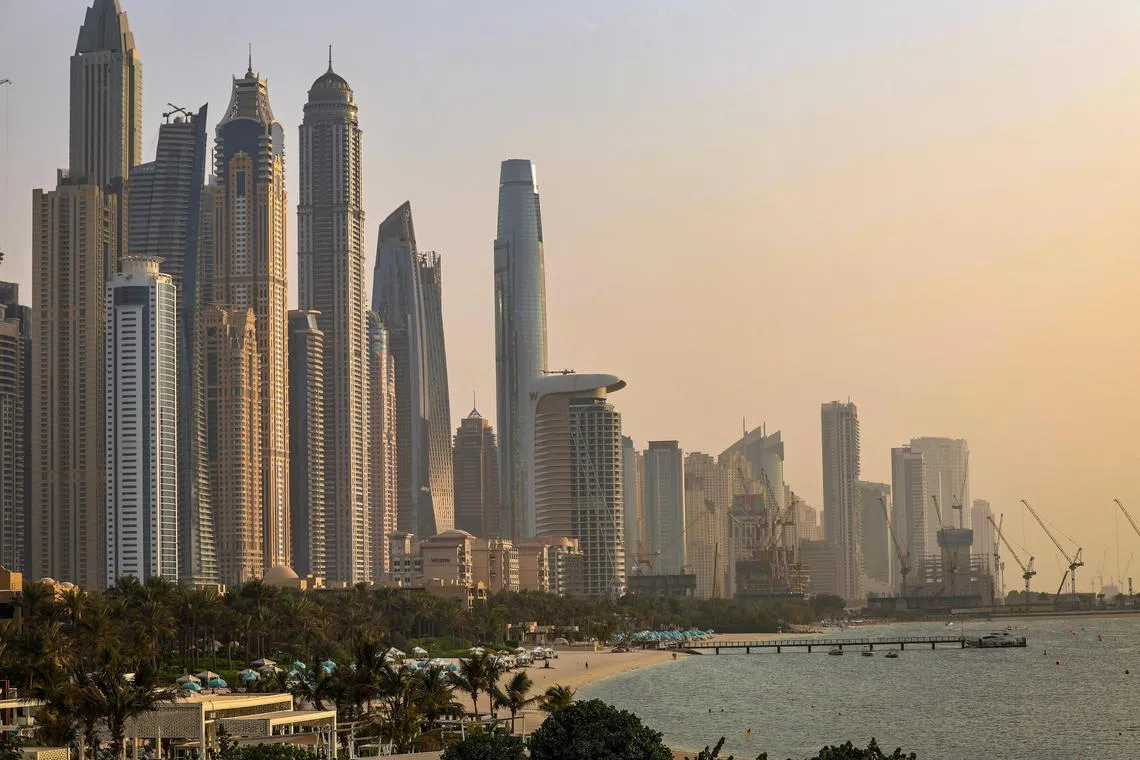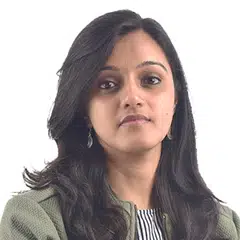‘Little India’ in Dubai grows as Golden visa attracts Indian professionals and entrepreneurs
Sign up now: Get ST's newsletters delivered to your inbox

Wealthy Indians, entrepreneurs and skilled professionals are choosing the UAE for its tax-free regime, high standards of living, and low rates of crime.
PHOTO: AFP
Follow topic:
- Wealthy, educated Indians seek the UAE's Golden visa for work, savings, and cultural familiarity.
- The UAE Golden visa, launched in 2019, attracts diverse talents with long-term residency and benefits like zero income tax.
- Factors like inequality, religious tensions in India, and thriving manufacturing/start-up sectors in the UAE are driving this migration.
AI generated
BENGALURU – More than two decades after he first set foot in Dubai for work, Mr J. Kumaresan finally received his Golden visa in 2023. It was a feat possible for the 56-year-old engineer only after the United Arab Emirates (UAE) recently eased its long-term residency programme to attract and retain global talent and capital.
The oil and gas contracts manager from India is not the only one who has moved from one of the world’s largest economies to the Emirates.
Wealthy Indians, entrepreneurs and skilled professionals are choosing the UAE for its tax-free regime, high standards of living and low rates of crime, those who have relocated told The Straits Times. It is also geographically and culturally closer to India than the US or Europe.
“Dubai is great for my field of work in the energy sector, and it is culturally familiar. I can also save much more money for my family by staying in Dubai, which has a more affordable cost of living than other places I have worked in, like Singapore,” said Mr Kumaresan.
Mr Kumaresan feels at home in Dubai, which has more than half of the four million-strong Indian diaspora in the UAE, including middle- and low-income Indians in fields like construction and hospitality.
The Emirates is home to the second-largest number of expatriate Indians after the US, and they account for almost 40 per cent of the population.
Trade flows between India and the UAE topped US$100 billion (S$128 billion) in the 2024 to 2025 financial year, rising from nearly US$73 billion in 2021 to 2022 after both countries signed an economic partnership agreement in 2022.
The UAE is now India’s third-largest trading partner after the US and China.
As the US, Britain and other major Western nations have tightened immigration policies for South Asians of late, affluent and educated Indians are now joining the millions of low-income migrant workers who have long thronged the Gulf region.
With Golden visa eligibility rules expanding earlier in 2025, Henley & Partners, a British investment migration advisory firm, is expecting 3,500 high-net-worth individuals in India to relocate to the UAE in 2025.
The UAE Golden visa was launched in 2019 to attract business investors or property owners there. But over the years, it has been opened up to people from a wider range of backgrounds, including scientists, artists and doctors, as the UAE seeks to diversify its economy.
Retired foreigners, outstanding students, professional gamers and luxury yacht owners are also eligible.
Unlike regular work visas, the Golden visa is not tied to a specific employer and is valid for much longer. It permits foreign nationals to live, work or study in the UAE without the need for a local sponsor. They also do not have to own property.
Valid for five to 10 years, the Golden visa is automatically renewable. Holders may also sponsor their spouse and children who are minors, and sometimes even their parents.
In 2023 alone, the UAE’s General Directorate of Identity and Foreigners Affairs (GDRFA) issued 158,000 Golden visas. This was nearly double the number issued in 2022, and more than triple the number issued in 2021.
The GDRFA did not respond to ST’s queries on the breakdown of the nationalities of Golden visa holders, but a check with property and relocation consultants showed that Indians – especially entrepreneurs, doctors and talented artists – contribute to a significant chunk of applications under the newly expanded categories for long-term residency.
Several Indian celebrities have also publicly disclosed their visa statuses.
They include Bollywood superstar Shah Rukh Khan, who is also a brand ambassador for Dubai tourism; Tamil movie star Rajinikanth, who got his visa in 2024; Malayalam star Mammootty; and playback singer Sonu Nigam.
India is one of the most unequal economies in the world, with the top 10 per cent earning around 58 per cent of the total national income. Between 2014 and 2024, the number of high-net-worth individuals rose by 72 per cent, spurred by stock market earnings, start-ups and rising family wealth.
Yet, 22 per cent of ultra-rich Indians are eager to move abroad for wealth preservation, easier tax burdens, safety, lifestyle aspirations and to give their children global exposure, found a 2025 survey by wealth management firm Kotak Private in partnership with EY.
The UAE does not easily offer citizenship to foreigners, but it is a compromise that many are willing to accept.
A diamond-polishing entrepreneur with a trading office in Dubai told ST that the UAE’s Golden visa comes with a zero personal income tax policy, unlike the EB-5 immigrant investor programme in the US, through which a person can get a green card by investing US$800,000 but is subject to both federal and state income taxes.
Moreover, immigration consultants told him that the backlog of US citizenship and immigration processes is now prohibitive.
A Muslim actor from Bollywood told ST that he opted for a Golden visa some years ago, after his family was harassed by far-right Hindu groups in India. He saw Dubai as “a safe place I can quickly leave to – a backup plan”.
“Initially, I was not thinking about leaving India. But last year, I moved with my wife and child to Dubai as the oppression of Muslims is only worsening (under the Hindu majoritarian government) in India, the textbooks are becoming right wing, there are constant attacks, I am always anxious. It is not an atmosphere (in which) to raise a child,” he said.
He said that although the UAE is an autocracy ruled by monarchs and has a controversial record in protecting labour rights, he has not been harassed or been the target of racism.
Noida-based property consultant Saurabh Gupta told ST that, in the past four years, inquiries from high-income professionals in India to buy villas and apartments in Dubai have doubled.
Almost all have gone on to make the purchase to create “a second home in Dubai, to save funds and for investment diversification”, he said. “Only years later do they even think about moving there or not.”
He added that his clients were not all millionaires, just Indians earning an annual salary of five million rupees (S$72,800) to six million rupees – the typical pay of middle management consultants in a multinational conglomerate.
“They pay 30 per cent to 40 per cent income tax in India, and are the cream of society, but they still struggle with bad roads and polluted air. The UAE is tax-free, people are more ‘rule following’, it’s cosmopolitan, things work,” Mr Gupta said.
In 2023, the Dubai Land Department recorded 1.6 million real estate transactions. Some 42 per cent of the more than 71,000 new investors were non-resident buyers.
Alongside this new wave of migration, Indian manufacturers are setting up factories in the UAE’s free trade zones that offer expats full ownership of companies, tax exemptions, simplified regulations and more flexible labour laws.
Of the 11,000 companies in the Jebel Ali Free Zone (Jafza) in Dubai, 2,300 are Indian, and the numbers are set to increase, with electric vehicle makers like Omega Seiki Mobility, Jindal Steel and pharma company Himalaya Wellness announcing in 2025 that they will set up factories there.
Mr Uday Narang, founder of Omega Seiki Mobility, told business news website The Ken: “Dubai offers easy access to regional and international capital, making it an ideal base for scaling operations quickly.”
His company is planning to set up a US$25 million manufacturing plant in Jafza, which will be its base to expand in the Gulf region.
More than 30 per cent of Dubai’s start-up community also comprises Indian nationals. They are attracted by good infrastructure in the free trade zones, as well as financial backing from sovereign wealth funds, availability of bank loans and global partnerships.
Eyewear company Lenskart, for instance, set up its Dubai plant in 2024 with US$500 million from sovereign wealth fund Abu Dhabi Investment Authority, and US$200 million from UAE-based asset management fund Falcon Edge Capital (now Alpha Wave Global).
Mr Talmiz Ahmad, a former Indian ambassador to the UAE and Saudi Arabia, said: “The free trade zones for export manufacturing and special economic zones for regional markets in the UAE are extremely well equipped.
“They are a bonanza for Indian small and medium companies that can’t set up as quickly at home (due to bureaucracy and slow decision-making). It’s no wonder Indian-owned companies dominate these zones.”
For Mr Kumaresan’s 21-year-old son, his reasons for applying for his own Golden visa are more personal.
“I feel like a foreigner in India, but Dubai has been a home that I can’t officially call a home,” said Mr Kavi Kumaresan, who is a screenwriting major in California but feels a sense of belonging in Dubai after having spent his formative years there.
With a Golden visa, he says he would “feel closer to the place I grew up in, secure my career, and my future”.


